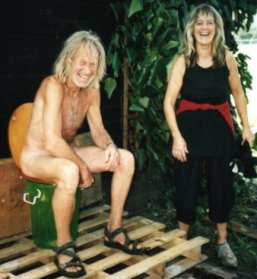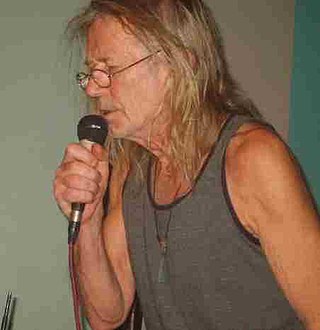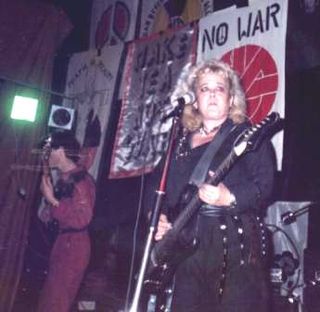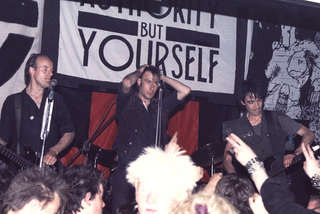Related Research Articles

Dial House is a farm cottage situated in south-west Essex, England that has been a self-sustaining anarcho-pacifist open house since 1967. The house is located in the countryside of Epping Forest in Ongar Great Park. It has been used as a base for a number of cultural, artistic, and political projects ranging from avant-garde jazz events to helping found the free festival movement.
Anarcho-punk is an ideological subgenre of punk rock that promotes anarchism. Some use the term broadly to refer to any punk music with anarchist lyrical content, which may figure in crust punk, hardcore punk, folk punk, and other styles.

Gee Vaucher is a visual artist primarily associated with the anarcho-punk band Crass.

The Green Anarchist, established in 1984 in the UK, was a magazine advocating green anarchism.

The Feeding of the 5000 is the first album by the anarcho-punk band Crass. The album was recorded on 29 October 1978 by John Loder at Southern Studios and was released the same year. It was considered revolutionary in its time due for its extreme sound, frequently profane lyrical content and the anarchist political ideals in the lyrics. The album also saw the introduction of Crass's policy of ensuring cheap prices for their records. The album is considered as one of the first punk albums to expound serious anarchist philosophy.

Penis Envy, released in 1981, was the third LP by the anarchist punk band Crass. The album was included at #36 on Rolling Stone's "40 Greatest Punk Albums of All Time" list in 2016.

The Anarchist Federation is a federation of anarcho-communists in Great Britain. It is not a political party, but a direct action, agitational and propaganda organisation.
Zounds are an English anarcho punk/post-punk band from Reading, Berkshire, formed in 1977. Originally they were part of the cassette culture movement, releasing material on the Fuck Off Records label, and were also involved in the squatting and free festival scene. The name of the band is derived from the old English minced oath "zounds", a contraction of "God's wounds", referring to the crucifixion wounds of Jesus Christ, formerly used as a mildly blasphemous oath.

Last Amendment, formerly known as The Crass Collective and Crass Agenda, is the working title of a series of collaborations by ex-members of the anarcho-punk band Crass and others. Although Crass had formally split up in 1984, Penny Rimbaud, Gee Vaucher, Eve Libertine, Steve Ignorant, Andy Palmer and Pete Wright came together in November 2002 to put on a concert at the Queen Elizabeth Hall in opposition to the at that time proposed War on Iraq. Although they did not all appear on the stage at the same time, most of the ex-members of Crass participated in the event under the name of The Crass Collective, along with other performers such as Ian MacKaye, Goldblade, the English Chamber Choir, Fun Da Mental, and Nabil Shaban, among others.
Youth in Asia were an early 1980s UK anarcho-punk band from London. They were differentiated from many other bands within that scene by their prominent use of the synthesizer. The band's first live performance was in Brussels in December 1981. They played several gigs at squatted venues, including Crass's squat gig at Zig Zag in London, and the Wapping Autonomy Centre with other bands including The Apostles, Crass, Flux of Pink Indians, Twelve Cubic Feet, The Mob, Poison Girls, Hagar the Womb, Riot/Clone, DIRT and others.

The Poison Girls were an English anarcho-punk band from Brighton. The singer/guitarist, Vi Subversa, was a middle-aged mother of two at the band's inception, and wrote songs that explored sexuality and gender roles, often from an anarchist perspective. The original Poison Girls line-up also included: Lance D'Boyle (drums); Richard Famous (guitar/vocals); Nil ; and Bernhardt Rebours (bass/synthesiser/piano).
Kill Your Pet Puppy (KYPP) was a UK punk zine that ran for six issues between 1979 and 1984. It was edited by Tony Drayton who had previously produced Ripped and Torn fanzine, which he started in October 1976 and for 18 issues until 1979.

Villa Amalia is the name of the building that hosted the former Second High School of Athens in Greece. It is located on the corner of Acharnon and Heiden streets, near Victoria metro station. It was an anarchist squat before its eviction in 2012. It reopened as a school in 2016.
Wapping Autonomy Centre was a self-managed social centre in the London Docklands from late 1981 to 1982. The project was initially funded by money raised by the benefit single Persons Unknown/Bloody Revolutions, as well as benefit gigs by Crass and The Poison Girls.
The Carnival Against Capital took place on Friday 18 June 1999. It was an international day of protest timed to coincide with the 25th G8 summit in Cologne, Germany. The carnival was inspired by the 1980s Stop the City protests, Peoples' Global Action and the Global Street Party, which happened at the same time as the 1998 24th G8 Summit in Birmingham. The rallying slogan was Our Resistance is as Transnational as Capital.

Crass were an English art collective and punk rock band formed in Epping, Essex in 1977 who promoted anarchism as a political ideology, a lifestyle and a resistance movement. Crass popularised the anarcho-punk movement of the punk subculture, advocating direct action, animal rights, feminism, anti-fascism and environmentalism. The band employed and advocated a DIY ethic in its albums, sound collages, leaflets and films.
Anarchism in Greece traces its roots to ancient Greece but was formed as a political movement during the 19th century. It was in the ancient era that the first libertarian thoughts appeared when philosophers based on rationality questioned the fundamentals of tradition. Modern anarchism in Greece emerged in the 19th century, heavily influenced by the contemporary European classical anarchism. Because of the Bolshevik success in the Russian Revolution of 1917 and the rise of the Communist Party, anarchism faded after the first decades of the 20th century. The collapse of the military junta put an end to the monopoly of the political power from the Right, whereas the dissolution of the Soviet Union diminished the allure of the Communist Party of Greece allowing anarchist groups to gain pace in Athens and other cities.

121 Centre was a squatted self-managed social centre on Railton Road in Brixton, south London from 1981 until 1999. As an anarchist social centre, the venue hosted a bookshop, cafe, infoshop, library, meeting space, office space, printing facility, and rehearsal space. Organisations using the space included Food Not Bombs, Anarchist Black Cross prisoner aid chapters, an anarcho-feminist magazine, a squatters aid organisation, and an anarchist queer group. Regular events at 121 Centre included punk concerts, a women's cafe night, and a monthly queer night. The centre kept a low profile and was one of the longest-lasting squats in London.
Animal rights are closely associated with two ideologies of the punk subculture: anarcho-punk and straight edge. This association dates back to the 1980s and has been expressed in areas that include song lyrics, benefit concerts for animal rights organisations, and militant actions of activists influenced by punk music. Among the latter, Rod Coronado, Peter Daniel Young and members of SHAC are notable. This issue spread into various punk rock and hardcore subgenres, e.g. crust punk, metalcore and grindcore, eventually becoming a distinctive feature of punk culture.

The Ambulance Station was a music venue that hosted punk, post-punk, indie and experimental music bands. It was located within a squatted building on the Old Kent Road in the London Borough of Southwark during the mid-1980s, and was set up by the experimental music group Bourbonese Qualk.
References
- ↑ "Stop The City Carnival". London Museum. Retrieved 21 August 2024.
- 1 2 3 4 5 6 7 8 9 10 11 12 13 Cross, Rich (2016). ""Stop the City showed another possibility": Mobilisation and movement in anarcho-punk". In Dines, Mike; Worley, Mike (eds.). The Aesthetic of Our Anger. Anarcho-Punk, Politics and Music. Minor Compositions. ISBN 978-1-57027-318-6.
- 1 2 3 "Stop the City". Kate Sharpley Library. Poison Pen. Retrieved 8 April 2019.
- ↑ Cross, Rich (2010). ""There Is No Authority But Yourself ": The Individual and the Collective in British Anarcho-Punk". Music and Politics. 4 (2). Music&Politics. doi: 10.3998/mp.9460447.0004.203 .
- ↑ Franks, Benjamin (2006). Rebel Alliances: The Means and Ends of Contemporary British Anarchisms. AK Press. p. 269. ISBN 9781904859406.